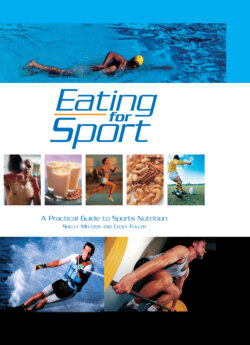Читать книгу Eating for Sport - Shelly Meltzer - Страница 9
THE CONTRIBUTION OF NUTRITION TO PERFORMANCE
ОглавлениеThe belief that nutrition plays an important role in physical fitness goes back to ancient times when athletes and soldiers preparing for battle consumed certain foods such as lion heart and deer liver for increased agility, speed or strength. Eating fashions of athletes have changed and, with the advancement of scientific methods (for instance, muscle biopsy techniques) and nutritional technologies, deer liver and lion heart have been replaced by substances such as carbohydrate powders, amino acids, creatine, sodium bicarbonate, amino acids and l-carnitine. However, in their quest for optimal performance, the underlying belief in the ergogenic – or performance-enhancing – abilities of certain foods and nutrients by athletes and fitness enthusiasts has remained the same.
Clearly, a fundamental role of nutrition in sport is to supply fuel for energy as well as all the essential nutrients and fluid. However, there is currently much debate on the bigger role that nutrition may play in enhancing performance by decreasing the perception of effort. There are also specific stressors that nutrition may counteract in sportspersons of different ages, genders and health status (see p33).
There has been a dramatic increase in the number of nutritional supplements on the market, all packaged with promises and claims of addressing one or more of the performance-limiting factors highlighted in the illustration on page 14.
In most cases nutrition and supplement recommendations are made without scientific evidence or taking into consideration how these recommendations will affect the athlete’s overall diet. Scientifically controlled studies to determine the effects of nutrition on sporting performance are costly and complex. There are also other factors that affect performance such as genetics, sleep, rest, training, skills, mental attitude and equipment.
Sports nutrition also has a practical role to play in advising on strategies to overcome problems such as limited time available for food preparation, travel nutrition or lack of appetite before a match. With a good understanding of the nutritional content and functions of food, sports supplements and fluid, as well as the energy demands of a sport, you can manipulate your diet to improve endurance, aid recovery, alter your body composition (muscle-to-fat-mass ratio), reduce fatigue, and improve mental performance and skill.
The role of nutrition and the components of performance. CHO = carbohydrate ATP = adenosine triphosphate CP = creatine phosphate GI = gastrointestinal
